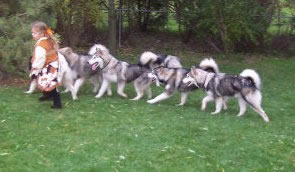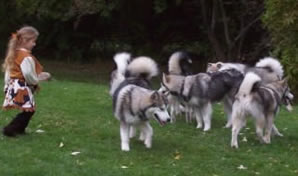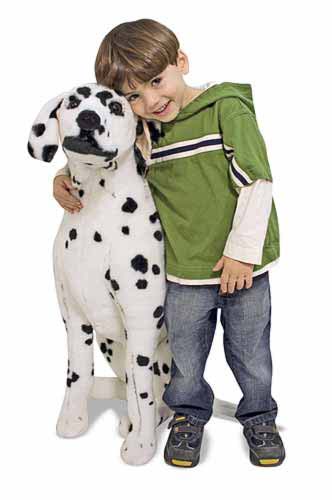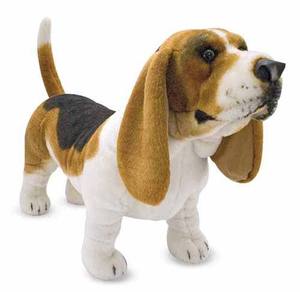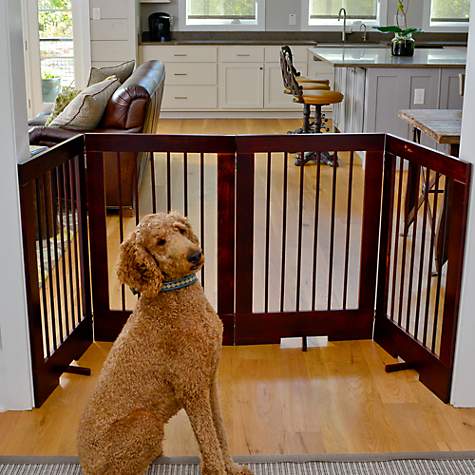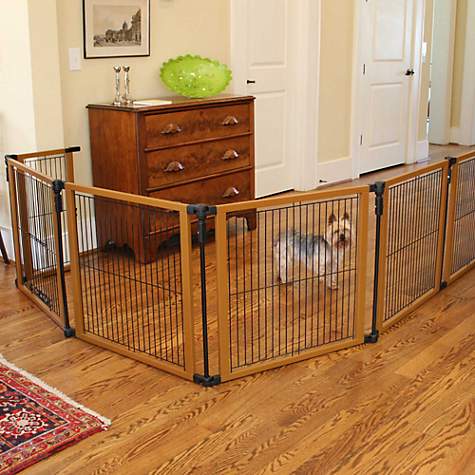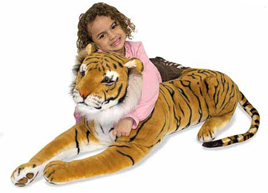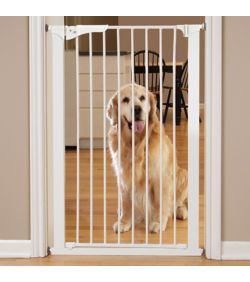Malamutes with Children
I don't know how many times I've heard - I have to get rid
of my Malamute because I'm having a baby. Huh???? WHY???? Malamutes,
if raised properly and socialized to children are great companions for children.
They are even protective and loving toward babies. But you must do your
job too. First, you must prepare an "only dog" for the birth
of his sibling pack member, then you must continue to make him feel a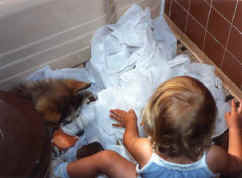 part of the family, and lastly you must continue to be the benevolent alpha
you've always been - firm and fair. Oh, almost forgot - when the child
is old enough - teach the CHILD manners too! That's all. There is
no good reason a Malamute must be given away or banished to an outdoor existence
just because of a baby. If he is, you haven't done YOUR job preparing
for the new family member. Maybe this will give you a place to start.
part of the family, and lastly you must continue to be the benevolent alpha
you've always been - firm and fair. Oh, almost forgot - when the child
is old enough - teach the CHILD manners too! That's all. There is
no good reason a Malamute must be given away or banished to an outdoor existence
just because of a baby. If he is, you haven't done YOUR job preparing
for the new family member. Maybe this will give you a place to start.
Preparing for the new pack member that is small and relatively hairless...
Normally you'll have at least 9 months to prepare so there is no excuse. If you know you'll have children some day, make it a point to socialize the dog to relatives, neighbors and friends children. Children are everywhere, and it's difficult owning a dog that doesn't like them - so socialize, socialize, socialize - let him meet babies, toddlers and school age kids. It's important for his well-rounded development. Before the baby arrives you should gradually give the dog less attention. Get him used to when you will be busy and not be at his beck and call. Now is a good time to brush up on that obedience training you never really got around to. He needs to learn to "sit", "stay", "down" and especially "off" and "wait". If you're feeling ambitious, "settle" (as in calm down) or "gently" (when taking food) are also good for him to know. Those will be very helpful with small children in the house. As you prepare the baby's room, let him explore it and check it out. By making it "off limits" before or after the baby arrives you are setting him up for jelousy. He needs to know whatever is happening, all this fussing and getting new stuff and the excitement in the air ... whatever it is, it's something new and wonderful and HE's a part of it. Now is also a good time to get your leash training conquered - so he can go for walks with etsa stroller later. If he's a determined puller, invest in a halti-collar and let him get used to going for walks occasionally with it, take a stroller along and see how he does. Halti's really work - even for "spaz" dogs!
Home from the hospital...
It's getting close now, Mom's gone to the hospital. Send a blanket home with someone for the dog to smell a day or so before, so he can meet his new family member ahead of time. Don't worry if he carries it off or even rips it to shreds - he's just getting every last little ounce of "good smell" out of it. It does NOT mean he's going to do that to the baby! Have the person involved the least with the dog carry the baby in so the dog's primary caregiver can greet him without a baby in arms. Let the dog sniff the baby under supervision. If you hover nervously the dog will think something is terribly wrong - maybe it's this "baby" thing, so supervise with confidence that you expect the dog to like the baby. Encourage gentle interaction WITH SUPERVISION. And as the child gets older, make sure the baby or toddler can't abuse the dog (pulling ears, poking eyes, climbing on to stand up). There may be some jelousy, like any siblings would have - but if the dog's routine doesn't change, he isn't left out, wasn't spoiled into thinking HE is your child, and perhaps gets extra treats or walks BECAUSE of the baby (walking the dog with the baby in a front pack or stroller) he will learn baby is no threat - actually a pretty cool addition to the pack. Malamutes love babies because they drop lots of food on the floor! (And you'll love your Malamute for his clean-up ability too). You may find your Malamute being especially protective of a baby. Often a Mal will offer to sleep in the baby's room and "guard" him at night - waking mom if the baby is in any distress. Malamutes naturally tend to love little children - even Shadow who was abused by adults still loves and trusts children. A tribute to this breed's undying love and devotion to them!
What the child is thinking...
Very young children, pre-twos really don't understand that a dog is a living, feeling being even if they know it's name and talk to it. They will think of him as nothing more than a big stuffed animal. Don't allow your toddler use the dog as something to stand with, especially an older or arthritic dog. Most mals love kids this age, IF they are well behaved and are kind. They take great delight in participating in dress-up or tea parties, playing ball or running - even intense active Malamutes will usually temper their rowdy play for a toddler. However, they are still large dogs, and can easily knock over a small child, so don't leave them alone unsupervised. After age two to age 7, children consider dogs funny things that comMalamutee with them for parental attention. They may also see the dog as a friend (and the dog, in turn sees them as a littermate), but they won't hesitate to turn against the dog if it is perceived as taking time and attention away from them. At this age there is a lot of tail yanking, ear pulling, and even unintentional sexual stimulation of the dog. The child cannot understand why it is not allowed, especially if the dog tolerates it - and many Malamutes will. However, some will not and this is the reason for many dog bites happen - especially to the face of children. A face bite is a correction YOU should have made before the dog had to do it!
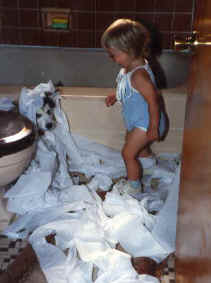 What
the dog is thinking...
What
the dog is thinking...
When you don't discipline the child, a Malamute, being a fully participating pack member (in other words, helping to raise the "puppy" in his eyes) tries to be helpful. If YOU don't discipline an inconsiderate or thoughtless child, HE WILL. And saying no is not enough. The adult must drop everything and go to the child, showing the child exactly what type of contact is acceptable.
When dogs discipline puppies they will snap and hold the puppy's muzzle in their mouth until the puppy settles down. This is what mother dogs do with unruly pups. If YOUR human pup is unruly, and you do nothing, your Malamute WILL likely discipline it - by attempting to hold it's "muzzle". Unfortunately, human puppies have delicate skin and not much of a muzzle to hold - hence a "face bite". Then of course, the adult humans panic, think the dog was trying to kill the child and get rid of the dog. When all the dog was doing was THEIR job. Sad but true. Don't let it happen in your home. Supervise, supervise, supervise!!! One of the dumbest things I've heard of people doing with Malamutes is leaving a small child unsupervised in a room with a Malamute and food around. The child reaches for the snack, the dog bites. The child is eating an icecream cone, the dog knocks the child over to steal it. Malamutes love food as much as they love your child, and once again, if they are told the rules are "don't steal stuff off the counters" they will consider disciplining a child that does. Also, beds are special places - that is a very important place to sit: on "alpha's bed". Be careful if you have the child and dog on the bed together with you. This is a good opportunity for jelousy - proximity to alpha is important to the Malamute and remember, the child is just a PUPPY in his eyes. Puppies are SUPPOSED to have fewer privledges...so avoid these situations when you can. If the child is on the bed, don't let the dog up. The child should ALWAYS have more status than the dog. If the Malamute should growl, take it seriously. He is telling you something. Not that he hates the child and wants to hurt it, but that he feels threatened by the child and needs you to do something about it. In this case (and it happens more with unneutered males than anything else), you need to keep them apart unless supervised closely, until the child is older and past the stage the dog feels threatened by. Baby gates can be helpful here. Homer was wonderful with children when we did therapy work, but as he got older, and was teased by a neighbor child, he had a difficult time dealing with our youngest who was 4 or 5 at the time. He did alot of growly-grumbling around her and we made it a point to watch a little closer. Once Stephanie grew up a little, she and Homer got along great - he just loved her ear scratches!
What we are thinking....
Teach your child how to interact with dogs. They've done studies and found when children learn proper behavior around dogs they are less likely to be bitten by ANY dog (not just their own). Another thing to do is neuter males young (under 8 months) as that will prevent much of the "attitude" they get, thinking they must keep young pack members in line. Usually females are not as bad in this regard, however, spaying females helps you avoid their "moods" and jealous behavior too.
Never allow play sessions between the Malamute and large groups of yelling, screaming, cavorting children. The danger is that a child might fall down and begin screaming, triggering an aggressive response in a sound dog. Dogs are dogs and have a prey drive - they don't think like us primates. Never forget this!
At 7 children enter a "concrete" state. They still can't deal with abstract concepts such as "why" a dog does obedience exercises, but it is good for them to see them done. Children at that age are often excellent trainers - they will usually be very consistent in practicing a "sit" with the dog and always remember the play session after. A good place to help the child learn to "train" is to demonstrate how to teach the dog something with the dog between you. Let the child hold the leash while you "help". This can be the beginning of a change in the relationship between child and dog - the dog will begin to see the child less as "littermate" and playmate to be bossed around, to one in which the child is viewed as another alpha figure with some authority.
As children get older, they can have small responsibilities taking care of the dog. But it is ultimately the parent that must see that it is done. Once children start school, they will have other interests. The dog may need something to do during the day while the child is gone or grow restless. At this point you may have to provide a play outlet for the dog and find the dog gravitating more toward the adults in the home. That's OK. Because in adolescence many kids gravitate back to the dog, and though they seem to have little to do with it anymore, the dog is a wonderful outlet for a teen that feels "nobody understands me". When in distress, the adolescent goes off with the dog, the one family member who understand him and always gave unconditional love when he was little. It's times like this that the hard work in owning a dog pays off - the dog educates the child in the vitures of loyalty and friendship.
Enjoy your children AND your Malamutes!!
